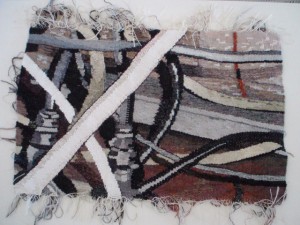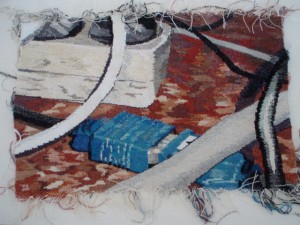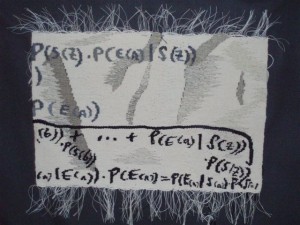Archive for the 'Mathematics' Category
Ingrid Wiener: Dr. Müllers Kabelfrühling middle middle
Sunday, February 28th, 2010Realometer: Changing
Friday, February 19th, 2010I guess, that my assumption is regarded as absurd. My assumption is: Concentration on text as text is a way of changing our attitude to the world.
Realometer: aesthetics also: esthetics
Tuesday, February 9th, 2010Aesthetics is an individual religion. (Thomas Raab: Nachbrenner). It is a religion of individuals, and it has individual forms. The common denominator of these forms is questionable. The answers depend on the point of view. From the point of view of gouvernementality: aesthetics is compensating and therefore stabilizing the idea of a free individual, which is a necessary function in today’s economy.
From the point of view of realometer: aesthetics is a line of flight which leads to radical changes
From the point of view of D.: aesthetics is a chance to become a pontifex maximus.
From the point of view of J.: aesthetics is an invitation to subversion.
From the point of view of M.:vaesthetics is approaching the absolute.
Ingrid Wiener: Erste Schritte auf dem Weg zu Bayes # 11
Friday, February 5th, 2010Ingrid Wiener: Erste Schritte auf dem Weg zu Bayes # 11, Gobelin 2007, 34×50cm nach Blei- und Filzstiftnotizen auf DIN A4
Realometer: Reading and writing
Wednesday, February 3rd, 2010J. says to Realometer:
When I read I write. Something from the outside enters into my inside and remains there. So you have to admit the principal difference between outside and inside.
Realometer answers: I doubt that. What you say is an affirmation of the universal significance of texts. Outside and inside are variables which are produced by texts.
M: Approaching Climate shift with machines
Sunday, January 31st, 2010The debate on climate shift is a signal that men cannot program his actions upon nature accurately. It is also a signal that men cannot predict the behaviour of nature. He cannot find the program according to which nature acts.
Powerlessness
Sunday, January 31st, 2010J: A post is not a book. A post in a blog is a way of agreement, an agreement to the programming of a social machine (partly programmed as a Turing Machine). A book (reading or writing) is a way of facing the power and the powerlessnes of subversion:
“There is no door for the blind.”*
and:
“God provides reading matter. He does not read.”**
* Edmond Jabès: Le Livre des Ressemblances [Paris 1976]. Paris: Gallimard, 1991, p. 195.
** Edmond Jabès: The little book of unsuspected subversion [Translated by Rosmarie Waldrop]. Stanford: Stanford University Press, 1996, p. 30.
Nils Röller: Realometer as a Turing Machine
Saturday, January 30th, 2010Realometer gathers informations about the Turing Machine (TM). Parts of himself function like a Turing Machine: He reads a sign in a certain state of mind; he accepts the sign or deletes the sign; he changes his state of mind or not; then he moves forward to the next sign or not (next click in yahooland).
D. doubts that. There are no discrete signs for a 20th century artist. Signs are only vehicles (patrol cars) of the common sense. Of course discrete signs are part of the art game, but they do not match to the demands of an art which is interested in challenging borders of perception (where does a spot of color starts to be more or less than a point, becomes part of a tree (see one post before), of a hand (see other posts before) or of something never seen or heard before (see other posts)?)
Tränen-Tote: Mogelei
Wednesday, December 30th, 2009Anmerkung zum Auto und damit zu Bildern, die wir heute haben, während frühere Zeiten sie nicht hatten: Während sich Duchamp und Beuys mit unsichtbaren Kräften (nicht-retinalen Osterhasen) beschäftigen, denken wir über Mechaniken nach, über Autos, Bratenwender, Maschinen. Im Unterschied zu dem Wirbel, den die Schamanen um ihre Osterhasen, Kojoten, Phiolen und Pelikanherzen erzeugen, machen wir nichts anderes, als in der Sprachmaschine zu sitzen und diverse Gänge ihrer Schaltung auszuprobieren, Versuche in Scheisse eben oder Versuche, den Ast abzusägen, auf dem wir sitzen.
Dabei mogeln wir – wenn mogeln bedeutet ungenau zu sein, wo man genau sein kann – wohl ein bisschen, wenn wir zum Beispiel dieses Gespräch mit einem Tonband aufzeichnen, also unsere Wortgangschaltungen von elektrisch-magnetischen Kräften aufnehmen und speichern lassen. Wir sollten darauf verzichten, solange wir nicht genau wissen, wie so ein Tonband genau funktioniert.
Wer sagt was wir sollen?
Die Sprachmaschine!
Und was ist mit dem Tonband?
Das legt uns nahe, aufzuzeichen, was wir hier sagen.



